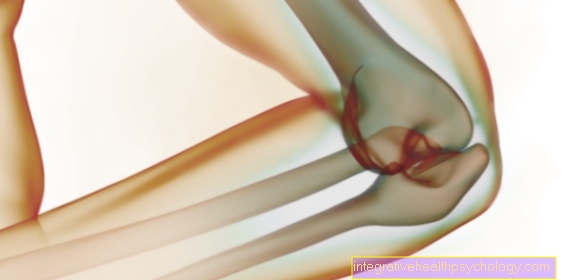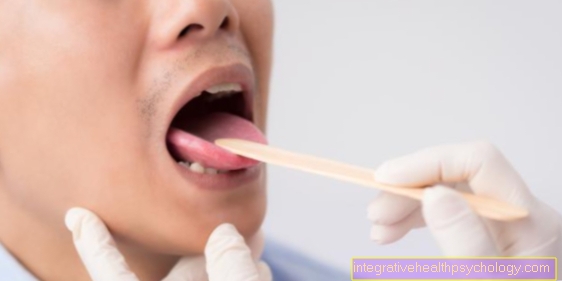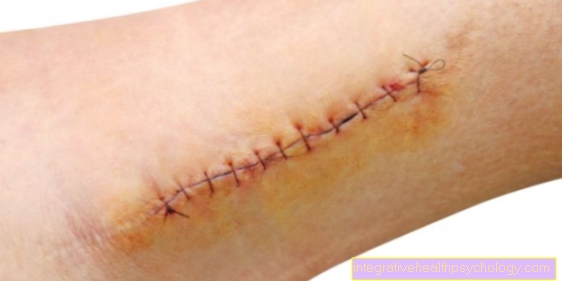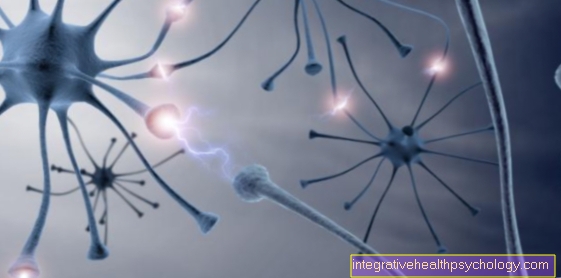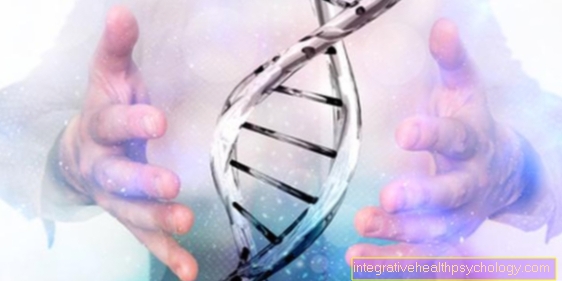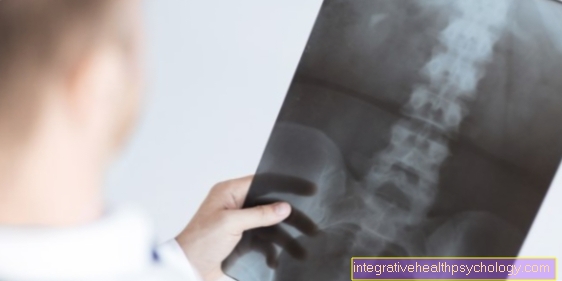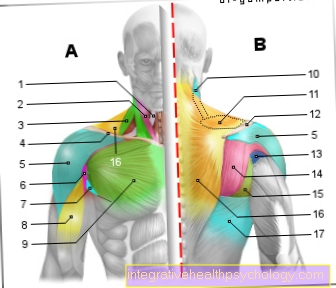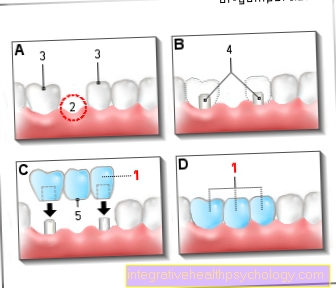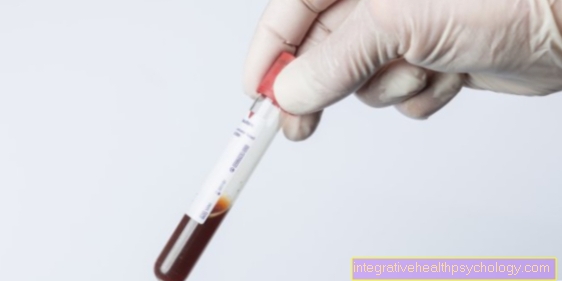Causes of Iron Deficiency
Synonyms
Sideropenia
English: iron deficiency
introduction
An iron deficiency can be caused by a wide variety of causes. Iron deficiency is particularly common due to bleeding or malnutrition. A diet or a vegan or vegetarian diet can be the cause of malnutrition.
Furthermore, the need for iron can be so increased that the sole diet with iron-containing foods is insufficient and supplements such as iron tablets must be used.

Iron deficiency due to an increased need for iron
Pregnant women and growing children need more iron to meet their needs. Pregnant women should consume around 30 mg of iron daily, i.e. the requirement of pregnant women is twice as high as the normal requirement of a woman.
Iron deficiency due to iron loss
A lot of iron is lost, especially through heavy bleeding. With 1 liter of blood, the body loses about 500 mg of iron. Bleeding of the gastrointestinal tract, which leads to an increased loss of iron, occurs particularly frequently. These can be caused by tumors or incorrect or overdosed medication intake. Kidney stones or bladder stones can also lead to bleeding and thus to a lack of iron. Long operations with high blood loss or serious accidents can also lead to iron deficiency. Frequent blood donation can also result in deficiency symptoms.
This article might also interest you: This is how you fix an iron deficiency
Dietary iron deficiency
Iron deficiency due to insufficient intake
Insufficient food intake can lead to an iron deficiency, especially in babies, toddlers, vegetarians and women. The recommended daily dose is 12mg for men and 15mg for menstruating women, as women lose blood and thus iron during their menstrual period.
Inadequate iron intake leads to iron deficiency in the long run. The causes for this are manifold. Above all, a strict diet without iron-containing foods or an unbalanced vegetarian / vegan diet can lead to deficiency symptoms.
Furthermore, ulcers of the intestines or chronic inflammatory diseases of the gastrointestinal tract can be responsible for insufficient iron absorption.
Surgical removal of parts of the stomach or intestines can also lead to an insufficient supply of iron to the organism due to the reduced absorption of iron. Certain medications, such as calcium tablets, can also negatively affect iron absorption in the intestine.
Would you like to eat more foods that contain iron? - Then find out more about: Foods with iron
Iron deficiency due to an unhealthy diet
There are many sides to an unhealthy diet. It can affect the intake of too much meat and “fatty” foods, as well as the daily consumption of sweets or fast food.
The danger of developing an iron deficiency arises above all for people who only eat “finished products” and sweets. Although some of these products contain iron, this amount is far too small to meet the body's normal needs.
Insufficient absorption
Antibiotics (tetracyclines), chronic stomach inflammation such as Crohn's disease or removal of part of the stomach or small intestine can lead to a poorer absorption of iron from food in the organism and thus to a deficiency. End-stage renal failure or chronic diseases such as celiac disease can also lead to iron deficiency.
Iron deficiency due to a vegetarian lifestyle
A life without meat does not necessarily have to lead to an iron deficiency.
Vegetarians are particularly at risk of developing iron deficiency if they do not eat enough iron-rich foods. These include, for example, lentils, beans, spinach and nuts. If the ingredients are not considered in the diet or if this is very one-sided, vegetarians again have a high risk of developing an iron deficiency.
Would you like to deal intensively with this topic? Our next article provides more information on this: Vegetarian diet
Iron deficiency due to vitamin B12 deficiency
Vitamin B12 deficiency can also lead to anemia. However, it is out of the question as a cause of iron deficiency.
Occasionally, people who have a vitamin B 12 deficiency also have an iron deficiency without this being recognized immediately in the blood count. The lack of vitamin B12 means that only a few new red blood cells can be formed.
Accordingly, only small amounts of iron are used. In people with low iron reserves, this constellation unfortunately leads to a falsified blood count. The unused iron makes the iron content in the blood appear normal to high. In the case of a vitamin B12 deficiency, it is therefore always important to check the iron values again after therapy.
Would you like more information on this topic? Then read our next article below: Vitamin B12 deficiency
Iron deficiency due to diseases
Iron deficiency due to thyroid disease
An underactive thyroid can negatively affect various metabolic processes. This also applies to the intake of important minerals or trace elements such as iron.
The subfunction can therefore lead to a deficiency symptom. In addition to iron, an underactive thyroid often leads to a deficiency in other important substances (such as magnesium or folic acid).
Do you suspect an underactive thyroid? - Then the following article might interest you: Symptoms of an underactive thyroid
Iron deficiency due to stress
Stress can lead to an iron deficiency. The body relies on a supply of iron through food because it cannot produce iron itself.
Stress can affect the body's digestive process. As a result, the absorption of important elements, such as iron, can be impaired or reduced.
Iron deficiency is rarely caused by stress alone. Usually, the combination of stress with other risk factors, such as heavy menstrual bleeding or an unbalanced vegetarian lifestyle, leads to iron deficiency.
Do you have a lot of stress? - Then the following article might interest you: Consequences of stress
Iron deficiency due to cancer or ulcers
Malignant ulcers in the gastrointestinal tract can cause chronic bleeding. A best-known example of this is, for example, colon cancer, also called colon carcinoma.
Continuous bleeding may also occur in the bladder due to a tumor disease. The blood loss in the context of the tumor diseases can lead to an iron deficiency and an associated anemia.
Do you want to recognize colon cancer? - Then read the following article: Colon Cancer Symptoms
Iron deficiency in women
Heavy menstrual periods
Typically women lose around 40 ml of blood per menstrual cycle.
With heavy menstrual bleeding, also known as hypermenorrhea, it is ≥ 80 ml of blood.
The greater loss of blood and the associated iron loss increases the risk of developing an iron deficiency. In contrast to women with a “normal” menstrual period, women with a heavy menstrual period are more likely to suffer from iron deficiency.
During pregnancy
During pregnancy, large amounts of iron are required for the proper supply of the mother and child. Iron plays an important role in many places.
Among other things, it is involved in increased blood formation, as well as an important component in the development of the child's nervous system, growth and the formation of the immune system.
Even with the mother's greatest efforts to eat healthier, the increased need cannot always be met by food. Because of this, iron deficiency in pregnancy is quite a common phenomenon. In order to ensure an optimal supply of iron, it is therefore often recommended that pregnant women take iron supplements.
Further information is available under our topic: Iron Deficiency During Pregnancy
By giving birth
Significant blood loss can occur during childbirth. With the bleeding, the body also loses some iron.
If the iron reserves are good, the deficiency can be quickly compensated for. The situation is different with women who already have scarce iron reserves in advance. Here the body's needs do not match the existing iron resources and this leads to an iron deficiency.
Other possible causes
Iron deficiency from blood donors
A blood donation usually consists of 500 ml of blood. The amount of iron contained therein is approx. 250 mg. That sounds like a lot at first, but in healthy people the body is able to compensate for the loss.
For people who only occasionally donate blood, there is initially no risk of developing an iron deficiency.
It can be different for people who belong to the iron deficiency risk group or who are long-term blood donors.
The risk group includes people with chronic inflammatory gastrointestinal diseases, gluten intolerance and vegans. Often these risk groups already have “sparse” iron supplies and are threatened by an iron deficiency more quickly if they are further lost.
In the case of permanent donors, the repeated blood samples per year can lead to an iron deficiency. Women with a heavy menstrual period in particular have an increased risk of developing iron deficiency when donating blood continuously.
Iron deficiency due to competitive sport
Competitive sport can lead to iron deficiency. Athletes need larger amounts of energy and oxygen for their performance.
In order to be able to transport the oxygen properly, the body produces larger amounts of the red blood pigment and increases its blood cell production. The organism depends on iron for these processes. The increased production of blood cells and the associated increased consumption of iron can lead to a deficiency in athletes.
Furthermore, sweating during sport can lead to an iron deficiency. Because of heavy sweating, small amounts of iron are always lost.
Read interesting information on this topic under: Sports nutrition and muscle building
Iron deficiency during operations
As a rule, blood and iron values are checked before operations.
People who travel preoperatively, i.e. before an operation, have insufficient iron stores, run the risk of developing iron deficiency more quickly. In particular, excessive blood loss during an operation increases the risk of iron deficiency.
The body is usually able to make up for blood loss and iron deficiency after the operation by using its iron reserves. In people with low iron stores, this compensation is simply not possible due to the lack of reserves.
An operation is a burden for a person and can exacerbate the existing preoperative symptoms. Read more about this under: Postoperative anemia
Can medication cause iron deficiency?
There are a number of drugs that influence iron absorption and can therefore also lead to iron deficiency.
These agents include certain cholesterol-lowering drugs. The active ingredient acetylsalicylic acid (aspirin), which is sometimes contained in headache tablets, can also impair iron absorption. To clarify an iron deficiency, a thorough drug evaluation is therefore always required.

